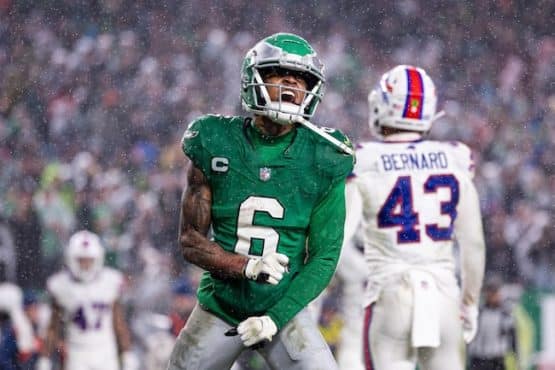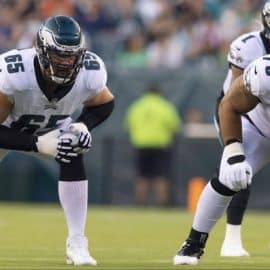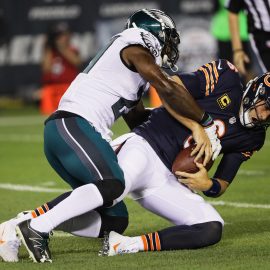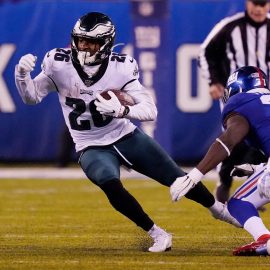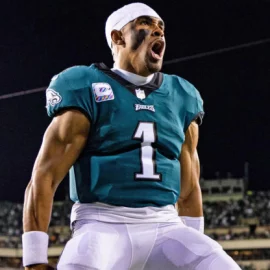Most of the phans who come here probably already know that the NFL “Franchise Tag” has decreased in value under the new collective bargaining agreement… but I am just really finding out about the actual hard numbers of the deal.
Overall decrease in the value of a franchise tag contract further complicates the relationship between Eagles management and guys like DeSean Jackson (above), and puts extra pressure on players and agents to get long-term guaranteed money deals done.
Here’s how the Franchise Tag values have changed by position under the new CBA:
Running Back: This year $7.7 million…. last year, $9.6 million (a DECREASE of $1.9 million);
Wide Receiver: This year $9.4 million…. last year, $11.4 million (a DECREASE of $2 million);
Tight End: This year $5.4 million…. last year, $7.3 million (a DECREASE of $1.9 million);
Offensive Line: This year $9.4 million…. last year, $10.1 million (a DECREASE of $.7 million);
Defensive End: This year $10.6 million…. last year, $13 million (a DECREASE of $2.4 million);
Defensive Tackle: This year $7.9 million….last year $12.5 million (a DECREASE of $4.6 million);
Linebacker: This year $8.8 million…. last year, $10.1 million (a DECREASE of $1.3 million);
Cornerback: This year $10.6 million…. last year, $13.5 million (a DECREASE of $2.9 million);
Safety: This year $6.2 million…. last year, $8.8 million (a DECREASE of $2.6 million);
—and finally, the only position that sees an increase in value:
Quarterback: This year $16.1 million…. last year, $ 14.4 million (an INCREASE of $1.7 million).
Beginning this Monday (February 20, 2012), NFL teams can begin to apply the franchise tag to players. They can do so up until March 5 at 4 p.m. ET. For those that don’t know, the franchise tag is a method of keeping players from hitting the open market. Previously, the franchise-tag number was generated by averaging the top-five salaries at a position to determine a number for that position.
This year, the franchise tag value will be a percentage of the overall salary cap figure for the previous five years.
Exception: The only instances this doesn’t apply: when a player already made more than the franchise-tag value, or when a player receives the franchise tag for the second-straight year, in which case tagging said player would cost 120 percent of their previous base salary.
Aside from the exception above, it’s clearly much more cost effective to utilize the franchise tag on a player in 2012 than it was in 2011. Wide receivers like DeSean Jackson, Dwayne Bowe and Marques Colston might not be tag candidates at $11.4 million. At $9.4 million, they certainly are.
Reports are already rolling in that Jackson will be tagged and that the team will seek to trade him once they place the tag on Jackson. Philly better be comfortable rolling with DJax if they can’t find a suitor, though, because the wide receiver is a good bet to swoop in and sign his tender quickly. The $9.4 million represents more than triple what Jackson’s made in his entire career thus far, and you can bet he’d like to see some guaranteed money.
“Worst case, of course, is that Philly ends up giving its top playmaker one more “contract year” at turning in a big performance before hitting free agency. $9.4 million is a lot to pay for a wideout, but it’s better than (a) doling out a big contract to someone new and/or a malcontent, or (b) letting Jackson walk for nothing in return.” — Will Brinson, CBSSports.com
Am I the only one in the room right now who thinks a lot of players are just now finding out how the new CBA has devalued their franchise tag numbers? And that a lot of NFL players in general are experiencing some form of reverse “sticker shock”?
One dramatic example I can give you of this is the Jermichael Finley situation in Green Bay…
At $5.5 million, the tight end is a no-doubt-about-it franchise tag choice. Finley is upset because last year the tight end franchise tag value was $7.3 million…So Finley’s reportedly ready to argue that he’s actually more of a wide receiver than a tight end and should be paid a $9.4 million tag as a wide receiver, based on the number of snaps he takes from a wide receiver position. (He may want to remove the words “best tight ends in the league” from his website then.)
The Packers don’t seem ready to give Finley a long-term deal yet, but they’re also not willing to let him go. That same spirit prevails among Eagles management with regard to playmakers like DJax… and the surprising reduction in franchise tag values is adding resistance and resentment to the mix.
Add The Sports Daily to your Google News Feed!

